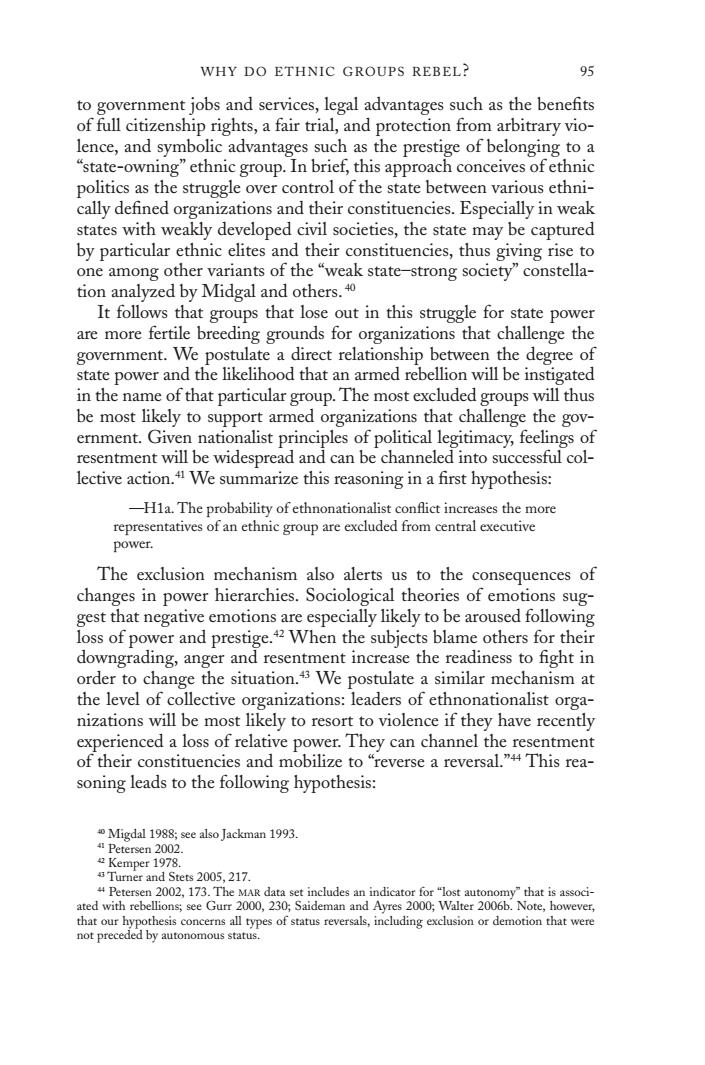正在加载图片...

WHY DO ETHNIC GROUPS REBEL? 95 to government jobs and services,legal advantages such as the benefits of full citizenship rights,a fair trial,and protection from arbitrary vio- lence,and symbolic advantages such as the prestige of belonging to a "state-owning"ethnic group.In brief,this approach conceives of ethnic politics as the struggle over control of the state between various ethni- cally defined organizations and their constituencies.Especially in weak states with weakly developed civil societies,the state may be captured by particular ethnic elites and their constituencies,thus giving rise to one among other variants of the "weak state-strong society"constella- tion analyzed by Midgal and others.40 It follows that groups that lose out in this struggle for state power are more fertile breeding grounds for organizations that challenge the government.We postulate a direct relationship between the degree of state power and the likelihood that an armed rebellion will be instigated in the name of that particular group.The most excluded groups will thus be most likely to support armed organizations that challenge the gov- ernment.Given nationalist principles of political legitimacy,feelings of resentment will be widespread and can be channeled into successful col- lective action.We summarize this reasoning in a first hypothesis: -H1a.The probability of ethnonationalist conflict increases the more representatives of an ethnic group are excluded from central executive power. The exclusion mechanism also alerts us to the consequences of changes in power hierarchies.Sociological theories of emotions sug- gest that negative emotions are especially likely to be aroused following loss of power and prestige.42 When the subjects blame others for their downgrading,anger and resentment increase the readiness to fight in order to change the situation.We postulate a similar mechanism at the level of collective organizations:leaders of ethnonationalist orga- nizations will be most likely to resort to violence if they have recently experienced a loss of relative power.They can channel the resentment of their constituencies and mobilize to"reverse a reversal."4 This rea- soning leads to the following hypothesis: 4 Migdal 1988;see also Jackman 1993. 4Petersen 2002. 4Kemper 1978. Turner and Stets 2005,217. 4 Petersen 2002,173.The MAR data set includes an indicator for"lost autonomy"that is associ- ated with rebellions;see Gurr 2000,230;Saideman and Ayres 2000;Walter 2006b.Note,however, that our hypothesis concerns all types of status reversals,including exclusion or demotion that were not preceded by autonomous status.why do ethnic groups rebel? 95 to government jobs and services, legal advantages such as the benefits of full citizenship rights, a fair trial, and protection from arbitrary violence, and symbolic advantages such as the prestige of belonging to a “state-owning” ethnic group. In brief, this approach conceives of ethnic politics as the struggle over control of the state between various ethnically defined organizations and their constituencies. Especially in weak states with weakly developed civil societies, the state may be captured by particular ethnic elites and their constituencies, thus giving rise to one among other variants of the “weak state–strong society” constellation analyzed by Midgal and others. 40 It follows that groups that lose out in this struggle for state power are more fertile breeding grounds for organizations that challenge the government. We postulate a direct relationship between the degree of state power and the likelihood that an armed rebellion will be instigated in the name of that particular group. The most excluded groups will thus be most likely to support armed organizations that challenge the government. Given nationalist principles of political legitimacy, feelings of resentment will be widespread and can be channeled into successful collective action.41 We summarize this reasoning in a first hypothesis: —H1a. The probability of ethnonationalist conflict increases the more representatives of an ethnic group are excluded from central executive power. The exclusion mechanism also alerts us to the consequences of changes in power hierarchies. Sociological theories of emotions suggest that negative emotions are especially likely to be aroused following loss of power and prestige.42 When the subjects blame others for their downgrading, anger and resentment increase the readiness to fight in order to change the situation.43 We postulate a similar mechanism at the level of collective organizations: leaders of ethnonationalist organizations will be most likely to resort to violence if they have recently experienced a loss of relative power. They can channel the resentment of their constituencies and mobilize to “reverse a reversal.”44 This reasoning leads to the following hypothesis: 40 Migdal 1988; see also Jackman 1993. 41 Petersen 2002. 42 Kemper 1978. 43 Turner and Stets 2005, 217. 44 Petersen 2002, 173. The mar data set includes an indicator for “lost autonomy” that is associated with rebellions; see Gurr 2000, 230; Saideman and Ayres 2000; Walter 2006b. Note, however, that our hypothesis concerns all types of status reversals, including exclusion or demotion that were not preceded by autonomous status